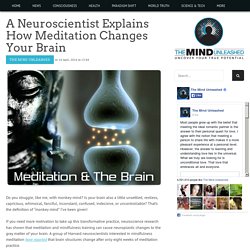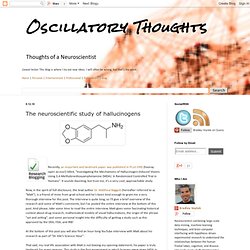

A Neuroscientist Explains How Meditation Changes Your Brain. Do you struggle, like me, with monkey-mind?

Is your brain also a little unsettled, restless, capricious, whimsical, fanciful, inconstant, confused, indecisive, or uncontrollable? That’s the definition of “monkey mind” I’ve been given! If you need more motivation to take up this transformative practice, neuroscience research has shown that meditation and mindfulness training can cause neuroplastic changes to the gray matter of your brain.
A group of Harvard neuroscientists interested in mindfulness meditation have reported that brain structures change after only eight weeks of meditation practice. Sara Lazar, Ph.D., the study’s senior author, said in a press release, “Although the practice of meditation is associated with a sense of peacefulness and physical relaxation, practitioners have long claimed that meditation also provides cognitive and psychological benefits that persist throughout the day.”
Britta Hölzel, the lead author on the paper says, Sarah Lazar also noted, Harvard Study Unveils What Meditation Literally Does To The Brain. The neuroscientific study of hallucinogens. Recently, an important and landmark paper was published in PLoS ONE (hooray open access!)

Titled, "Investigating the Mechanisms of Hallucinogen-Induced Visions Using 3,4-Methylenedioxyamphetamine (MDA): A Randomized Controlled Trial in Humans". It sounds daunting, but trust me, it's a very cool, approachable study. Now, in the spirit of full-disclosure, the lead author Dr. Matthew Baggott (hereafter referred to as "Matt"), is a friend of mine from grad school and he's been kind enough to grant me a very thorough interview for this post.
The interview is quite long, so I'll give a brief overview of the research and some of Matt's comments, but I've posted the entire interview at the bottom of this post. At the bottom of this post you will also find an hour-long YouTube interview with Matt about his research as part of "Dr. That said, my real-life association with Matt is not biasing my opening statement; his paper is truly landmark for many reasons. I think you hit the nail on the head. Understanding Why Pornography Addiction is a Brain Disease. “One ring to rule them all, One Ring to find them.

One Ring to bring them all, and in the darkness bind them. In the Land of Mordor where the shadows lie.” -J.R.R. Tolkien Until the general public becomes more informed about the reality of how pornography impacts the human brain it will continue to be looked upon as a moral weakness or a form of mere entertainment. Pornography addiction is the most difficult addiction to treat because it hits at the very core of our humanity. Throughout my professional carrier I have spent countless hours treating those with chemical dependency addictions such as with alcohol, heroin/opiates, cocaine, methamphetamine, marijuana etc.
Our brains are made up of tiny chemicals called neurotransmitters. The physical/chemical brain has a tremendous capacity to gain control of the mind. In essence, the only difference between a heroin or cocaine addict is the way the drug enters the system. “I am sick to my core by virtue of my indulgence in pornography. Flouride on my mind. Emotiv - Brain Computer Interface Technology.